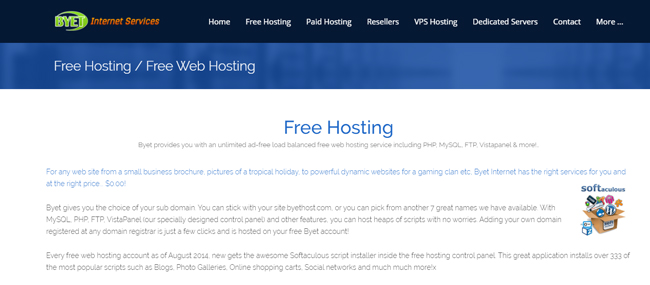Starting a website can feel overwhelming, especially when you’re worried about costs. Luckily, there are free WordPress hosting providers that make it easy to get your site up and running without spending a dime. These options are perfect for beginners, hobby bloggers, or anyone testing out ideas before committing to a paid plan. While free hosting has its limitations, it’s a fantastic way to dip your toes into the world of website creation without financial risk. In this post, we’ll explore what free WordPress hosting is all about and why it might be the right choice for you.
Benefits of Using Free WordPress Hosting Providers

Choosing a free WordPress hosting provider can offer several advantages, especially if you’re just starting out or working on a small project. Here are some of the main benefits:
- No Cost: The biggest perk is that it’s completely free. You can launch your website without any upfront investment, making it ideal for students, hobbyists, or those testing ideas.
- Easy to Get Started: Many free hosts provide simple, user-friendly interfaces that guide you through the setup process. No technical skills? No problem!
- Good for Learning: Using free hosting allows you to learn how WordPress works, experiment with themes and plugins, and understand website management without risking money.
- Quick Deployment: With pre-installed WordPress options and automated setup tools, you can have your website live in just a few clicks.
However, it’s also important to recognize some limitations, like bandwidth restrictions, limited storage, and the possibility of ads placed by the host. Still, for many, the benefits outweigh these downsides, especially when you’re just starting out. Free hosting providers give you a low-risk way to build, learn, and grow your online presence before considering upgrades or paid plans.
3. Factors to Consider When Choosing a Free Hosting Service

Picking the right free hosting provider for your WordPress website isn’t just about grabbing the first option you see. There are several important factors to keep in mind to make sure your site runs smoothly and meets your needs. Let’s walk through some of the key things to consider:
Performance and Speed
Your visitors won’t stick around if your site loads slowly. Look for hosts that offer good server uptime and fast load times. Even free plans can vary widely in performance, so it’s worth checking reviews or testing the service if possible.
Storage and Bandwidth Limits
Free hosting plans often come with restrictions on storage space and bandwidth. Think about how much content you plan to upload—images, videos, blog posts—and choose a plan that won’t bottleneck your growth. If you expect traffic to increase, consider plans that offer scalability or at least generous limits.
Customization and Flexibility
Some free hosts restrict what themes, plugins, or customizations you can use. If you want greater control over your site’s appearance and functionality, look for providers that support standard WordPress features without too many restrictions.
Support and Reliability
Things will go wrong sometimes—servers crash, or you might need help. Check whether the host provides support options like email, chat, or forums. Also, research their uptime guarantees—ideally, they should promise at least 99% uptime.
Ads and Branding
Many free hosts include their own ads on your site or add branding elements. If you want a professional look, choose a provider that minimizes or doesn’t include intrusive ads. Some may allow you to remove branding with a small upgrade later on.
Security Features
Security is crucial. Look for providers that include basic security features like SSL certificates, malware scanning, or regular backups. Even free hosting should offer some level of protection to keep your site safe.
Ease of Use
If you’re new to WordPress, an intuitive control panel or one-click installations can save you a lot of headaches. Choose a host that makes setup and management straightforward.
4. Top Free WordPress Hosting Providers in 2024

Now that you know what to look for, let’s explore some of the best free WordPress hosting options available in 2024. Each has its own unique strengths, so pick one that aligns with your goals and comfort level.
1. WordPress.com
WordPress.com is a popular choice for beginners. It offers a free plan that’s easy to set up and manage. You get a subdomain (like yoursite.wordpress.com), automatic updates, and built-in security. However, customization options are limited unless you upgrade to paid plans. Ideal for bloggers or hobby sites wanting a hassle-free experience.
2. InfinityFree
InfinityFree provides unlimited storage and bandwidth on its free plan, which is pretty rare. It supports custom domains and offers a decent control panel. The main downside? Support isn’t 24/7, and some users report occasional slowdowns. Still, it’s a solid option for small sites or testing ideas.
3. 000webhost
Owned by Hostinger, 000webhost is one of the most well-known free hosting providers. It offers 300 MB of storage, limited bandwidth, and a simple one-click WordPress installer. The platform is beginner-friendly, but keep in mind that it has a history of occasional downtime. A good starting point for new bloggers.
4. AwardSpace
AwardSpace offers 1 GB of storage, one domain hosting, and support for PHP and MySQL databases—great for small WordPress sites. The interface is straightforward, and they provide regular backups. The trade-off? Limited bandwidth and some ads on free plans.
5. Byet.host
Byet.host provides decent resources for free, including support for PHP and MySQL, and a user-friendly control panel. It’s suitable for experimenting with WordPress or hosting small projects. Keep in mind, support is community-based, so troubleshooting might take some time.
Each of these providers has its quirks, but they all offer a way to get your WordPress site online without spending a dime. Just remember, free hosting is often best suited for testing, learning, or hobby projects—if your site starts to grow, consider moving to a paid plan for better performance and features.
5. How to Set Up Your WordPress Site on a Free Hosting Platform

Getting your WordPress site up and running on a free hosting platform might sound intimidating at first, but it’s actually quite straightforward — especially if you follow a few simple steps. Whether you’re a complete beginner or just looking to experiment with your site ideas, this guide will walk you through the process.
Step 1: Choose Your Free Hosting Provider
Start by selecting a hosting provider that offers free WordPress hosting. Some popular options include WordPress.com, InfinityFree, and 000webhost. Take some time to compare their features, limits, and user reviews to find the best fit for your needs.
Step 2: Sign Up for an Account
Once you’ve picked your provider, create an account. This usually involves providing your email address, creating a password, and confirming your account via email. Some platforms might ask for basic details about your site or your goals.
Step 3: Install WordPress
Most free hosting services now offer one-click WordPress installation, making setup super easy. Look for options like “Install WordPress” or “Site Builder” in your hosting dashboard. Click through, choose your site’s name and admin credentials, and wait a few moments while WordPress is installed automatically.
Step 4: Customize Your Website
After installation, you’ll be directed to your WordPress dashboard. Here, you can pick a theme, install plugins, and start creating your content. Keep in mind that free hosting often comes with limited themes and plugin options, so choose wisely based on what you need.
Step 5: Connect Your Domain (Optional)
If you want a custom domain (like yourwebsite.com instead of yourwebsite.provider.com), many free hosts offer a subdomain. Some may allow you to connect your own domain for free or for a small fee. Check your host’s documentation for instructions on how to do this.
Step 6: Launch Your Site!
When everything looks good — your content is uploaded, your site is customized, and you’re satisfied with the design — it’s time to go live! Hit the publish button, share your website link with friends and potential visitors, and start growing your online presence.
It’s that simple! While free hosting might have some quirks, it’s a fantastic way to learn the ropes, test ideas, or create a small personal site without any upfront costs.
6. Limitations and Potential Drawbacks of Free Hosting
While free WordPress hosting can be a lifesaver when you’re just starting out or working on a tight budget, it does come with a few caveats. It’s important to understand these limitations so you can decide whether it’s the right choice for your project — or if it’s worth investing in paid hosting later on.
1. Limited Resources
- Storage Space: Free hosts often offer minimal storage, sometimes just a few hundred megabytes. This can be enough for a small blog or portfolio but quickly becomes restrictive as your content grows.
- Bandwidth: Limited bandwidth can mean your site loads slowly or gets temporarily shut down if you attract a lot of visitors.
- Performance: Sharing server resources with many other sites can result in slower load times and less reliable uptime.
2. Ads and Branding
Many free hosting providers will display their ads on your site, which can detract from your branding and professionalism. Sometimes, you might not have control over the ads, and they could even be unrelated or undesirable.
3. Subdomains and Domain Restrictions
Most free hosting services give you a subdomain (e.g., yoursite.provider.com) rather than a custom domain. While this is fine for testing or hobby sites, it doesn’t look as professional for business or portfolios.
4. Limited Customization and Plugins
Free plans often restrict access to advanced themes, plugins, or custom code. This limits your ability to fully tailor your site’s appearance and functionality.
5. Lack of Support and Security
Support options are usually minimal or non-existent on free plans. If something goes wrong, you might be left troubleshooting on your own. Plus, security features like SSL certificates (for HTTPS) might not be included, which can affect your site’s safety and trustworthiness.
6. Potential for Downtime and Data Loss
Free hosts may have higher downtime rates, and data loss can occur if the provider faces server issues or discontinues their free service. Regular backups are essential if you’re relying on free hosting.
In summary: While free WordPress hosting is a fantastic starting point, it’s best suited for learning, experimentation, or small projects. If your site grows or requires more professionalism, upgrading to paid hosting might be the next smart step to ensure stability, security, and control.
Conclusion and Recommendations for New Website Owners
Choosing the right free WordPress hosting provider is a crucial step for new website owners looking to establish an online presence without upfront costs. While free hosting options often come with limitations such as restricted bandwidth, limited storage, and occasional ads, they can be an excellent starting point for beginners exploring their niche or testing ideas. It’s important to consider factors like reliability, customer support, ease of use, and scalability when making your decision.
Based on our review, here are some key recommendations:
- Prioritize reliability and uptime to ensure your site remains accessible to visitors.
- Check the level of customer support—having quick assistance can save you from potential setbacks.
- Assess the available features such as one-click WordPress installation, security measures, and backups.
- Be aware of limitations and plan for potential upgrades if your website grows.
For those just starting out, testing different providers can help you find the best fit before investing in premium hosting. Remember, a good hosting environment lays the foundation for your website’s success, so choose wisely based on your current needs and future plans. Ultimately, the right free hosting provider can help you build a solid online presence while you learn and grow your website skills.


